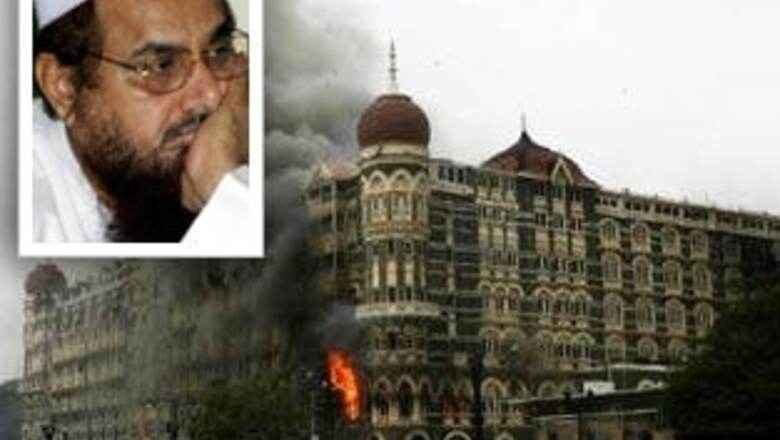
views
Lahore: A Pakistani court on Tuesday ordered the release of a hard-line Islamist cleric allegedly linked to last year's deadly attacks in Mumbai, his lawyer said, setting the stage for a new round of tensions between India and Pakistan.
The Lahore High Court's decision to free Hafiz Mohammed Saeed came amid growing tension in Pakistan's northwest, where security forces on Tuesday rescued dozens of students and teachers kidnapped by militants and where the army continues to battle Taliban fighters in the Swat Valley.
India has demanded Pakistan vigorously pursue those behind the November siege of its commercial capital that killed 164 people and left nine of 10 gunmen dead.
Pakistan has said it took several alleged suspects into custody, including Saeed, the head of a charity that the UN says is a front group for Lashkar-e-Toeba, (LeT) the militant organization blamed in the attack.
But Pakistan has a poor track record of prosecuting alleged militant leaders, and India and Pakistan argued for weeks after the attack over the proper amount of evidence needed to convict the suspected masterminds.
On Tuesday morning, Saeed's lawyer, A K Dogar, emerged from the courthouse to declare that jurists had decided Saeed's continued detention was without basis. A copy of the court order could not immediately be obtained.
Saeed spokesman Yahya Mujahid told The Associated Press that the cleric was under house arrest in Lahore, which is in eastern Pakistan near the Indian border. Saeed's detention dates to December.
Saeed helped establish Lashkar-e-Toeba two decades ago to fight Indian rule in Kashmir. After the group was banned, Saeed set up an Islamic charity called Jamaat-ud-Dawa.
Mujahid said Tuesday's decision vindicated the stance of Saeed's supporters that Jamaat-ud-Dawa is not linked to terrorism.
"We hope this order will be implemented," he said. "Our organization is working to serve the suffering humanity."
PAGE_BREAK
Other developments on terror front in Pakistan
Earlier on Tuesday, security forces rescued dozens of students, teachers and staff from a boys school who had been taken captive by militants in the northwest, the army said. The rescue apparently ended a brief kidnapping saga that further rattled the country.
In brief comments, Maj Gen Athar Abbas said 80 people, 71 of them students, were found by forces manning a checkpoint in the Goryam area as their small convoy of vehicles, escorted by militants, headed toward the South Waziristan region bordering Afghanistan.
The region is a major al-Qaeda and Taliban stronghold from which militants are thought to launch attacks inside Afghanistan as well.
"Everyone is safe and sound," Abbas said. "An exchange of fire took place, but the miscreants-terrorists fled the scene when they saw the strength of the armed forces."
A top area government official, Sardar Mohammed Abbas, told The Associated Press that all the kidnap victims were rescued, though he gave the number as 76.
Details about the kidnapping have been murky, and originally as many as 500 people were said abducted. Overnight, at least 200 students were traced to their homes, officials said.
Police official Meer Sardar said the abduction occurred about 20 miles (32 kilometers) from Razmak Cadet College. The victims were leaving the school after they were warned to get out in a phone call from a man they believed to be a political official, Sardar said, citing accounts from a group of 17 who managed to escape.
About 30 buses, cars and other vehicles were carrying the students, staff and others when they were stopped by a large group of gunmen in their own vehicles, according to a school employee who was among those who escaped.
The employee requested anonymity out of fear of Taliban reprisal. He said the assailants carried rockets, Kalashnikovs, hand grenades and other weapons.
Cadet colleges in Pakistan are usually run by retired military officers and educate teenagers. They also typically provide housing.
North and South Waziristan are major al-Qaida and Taliban strongholds bordering Afghanistan. The latter is the main base for Pakistani Taliban chief Baitullah Mehsud. The regions lie roughly 150 miles (240 kilometers) from the Swat Valley.
Clashes in the past three days in South Waziristan have killed at least 25 militants and nine soldiers, fueling speculation that a month after re-igniting its battle against Taliban militants in Swat, the military will widen the offensive to the tribal area.
The army spokesman, however, said troops on the ground were merely reacting to attacks, not opening a new front, and that the militants were trying to divert the army's attention from the fight in Swat.
Journalists have limited access to the tribal belt and Swat, making it difficult to independently verify information from the Pakistani military or other sources.




















Comments
0 comment